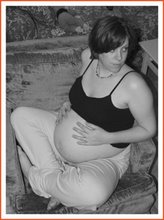my sister was kind enough to forward me this information about the plastic used in baby bottles and sippy cups. luckily for me, my kids never had bottles and their sippy cups seem to be okay (sort of).
anyways, i thought i would share this tidbit with you so everyone can become as paranoid as i am.
Dr. Fred vom Saal has been researching BPA for decades. He is a Professor of Biological Sciences, University of Missouri. He was recently on the radio show,
Ontario Today, on CBC. This is a summary of what he had to say about the dangers of plastics and our food:
Hard, clear plastics, that are glass-like, are generally not safe.
They are Polycarbonate plastic, and contain BPA. BPA is a very potent sex hormone, and was considered for birth control drugs in the 1950s. Most plastics with a #7 in the recycling symbol have BPA as well as Nalgene bottles. It poses a real problem for adults, but especially for children. However, this type of plastic is often used in sippy cups, baby bottles, etc. Here are some simple rules to remember:If it is clear, hard plastic, do not use it! When exposed to heat, the chemical BPA is broken down and is released into liquid in bottle.
Avoid #7 plastic Nalgene containers are not safe, contrary to popular belief. They contain BPA.Brita containers themselves are not safe. Brita containers are clear, hard plastic, and have BPA-so it leaches out the chemical into the water again! The older the container is, the more BPA will leach into water. However, carbon filters (like Brita filters) remove BPA and other plastic chemicals (i.e. PVC) and are in fact the only way to get out these toxins. These chemicals are in water supply, and no municipal water treatment removes them.
Tupperware: many different types. If material is not hard and glasslike, not clear, it does not contain BPA, and is good for freezing food. However, don't put any hot foods into them. There is no such thing as a safe, heatable, microwaveable plastic. The hotter molecules are the more leaching that will occur. Don't use hard, clear plastic storage containers, especially under heat, and warmth.
Baby bottles: there are types of bottles on the market that do not contain BPA. However, many have BPA. Smaller, glass baby bottles are best. Baby bottles that you can't see through will not contain BPA. Don't heat them, and they will not leach the sex hormone BPA into baby foods.
Alternatives:
Plastic #2 (polyethylene), #4, and #5 (polypropylene) are not
clear and are safer to use. However, note cautions below.
Glass containers do not leach out anything.
Metal-lined containers (some sports water bottles are like this) do not leach out.
Caution:
It is voluntary whether a number is put on plastic Water bottles (#6-polystyrene) - not as bad as #7 and #3 (which should be avoided at all costs, especially for men and boys). However, #6 has toxicity associated with it. Don't use it.
Pop bottles, and some water bottles use plastic #1 (a polyethylene base, or PET, is safer). However, don't reuse it, it becomes dangerous after approximately 15 uses, as it emits the chemical antimony. These containers are best for single use only. The longer water is in plastic #1, the greater the risk of chemicals leaching out of it. It is meant to be recycled after single use.


No comments:
Post a Comment